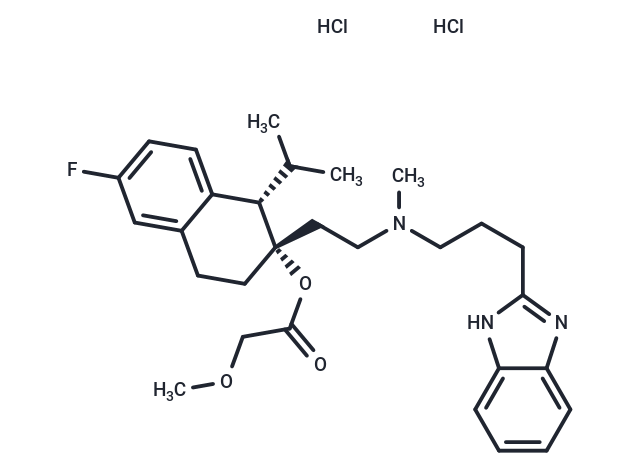Shopping Cart
- Remove All
 Your shopping cart is currently empty
Your shopping cart is currently empty

Mibefradil dihydrochloride (Ro 40-5967 (dihydrochloride)) is an blocker of calcium channel with moderate selectivity for T-type Ca2+ channels (T-type and L-type currents with IC50s of 2.7 μM and 18.6 μM, respectively).

| Pack Size | Price | Availability | Quantity |
|---|---|---|---|
| 1 mg | $40 | In Stock | |
| 5 mg | $92 | In Stock |
| Description | Mibefradil dihydrochloride (Ro 40-5967 (dihydrochloride)) is an blocker of calcium channel with moderate selectivity for T-type Ca2+ channels (T-type and L-type currents with IC50s of 2.7 μM and 18.6 μM, respectively). |
| Targets&IC50 | Ca2+ channel, T-type:2.7 μM , Ca2+ channel, L-type:18.6 μM |
| In vitro | Mibefradil dihydrochloride inhibits reversibly the T- and L-type currents with IC50 values of 2.7 and 18.6 μM, respectively.[1].Mibefradil inhibited Orai1, Orai2, and Orai3 currents dose-dependently. The IC50 for Orai1, Orai2, and Orai3 channels was 52.6, 14.1, and 3.8 μM respectively. Outside-out patch demonstrated that perfusion of 10-μM mibefradil to the extracellular surface completely blocked Orai3 currents and single channel activity evoked by 2-APB. Intracellular application of mibefradil did not alter Orai3 channel activity. Mibefradil at higher concentrations (>50 μM) inhibited Ca2+ release but had no effect on cytosolic STIM1 translocation evoked by thapsigargin. Inhibition on Orai channels by mibefradil was structure-related, as other T-type Ca2+ channel blockers with different structures, such as ethosuximide and ML218, had no or minimal effects on Orai channels. Moreover, mibefradil inhibited cell proliferation, induced apoptosis, and arrested cell cycle progression[3]. |
| In vivo | Compared with the saline-treated group, rats receiving Mibefradil or Ethosuximide show significant lower CaV3.2 expression in the spinal cord and DRG. |
| Cell Research | Human Orai1-3 cDNAs in tetracycline-regulated pcDNA4/TO vectors were transfected into HEK293 T-REx cells with stromal interaction molecule 1 (STIM1) stable expression. The Orai currents were recorded by whole-cell and excised-membrane patch clamp. Ca2+?influx or release was measured by Fura-PE3/AM. Cell growth and death were monitored by WST-1, LDH assays and flow cytometry[3]. |
| Alias | Ro 40-5967 (dihydrochloride) |
| Molecular Weight | 568.55 |
| Formula | C29H40Cl2FN3O3 |
| Cas No. | 116666-63-8 |
| Smiles | Cl.Cl.COCC(=O)O[C@]1(CCN(C)CCCc2nc3ccccc3[nH]2)CCc2cc(F)ccc2[C@@H]1C(C)C |
| Relative Density. | no data available |
| Storage | Powder: -20°C for 3 years | In solvent: -80°C for 1 year | Shipping with blue ice. | |||||||||||||||||||||||||||||||||||
| Solubility Information | H2O: 122 mg/mL (214.58 mM), Sonication is recommended. | |||||||||||||||||||||||||||||||||||
Solution Preparation Table | ||||||||||||||||||||||||||||||||||||
H2O
| ||||||||||||||||||||||||||||||||||||

Copyright © 2015-2025 TargetMol Chemicals Inc. All Rights Reserved.